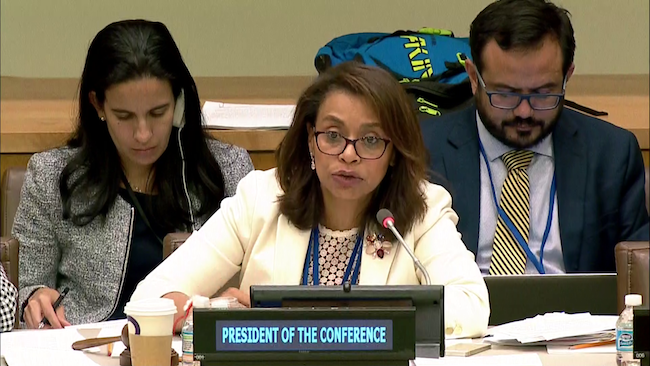By J Nastranis

UNITED NATIONS (IDN) – As the second substantive session of the ‘UN Conference to Negotiate a Legally Binding Instrument to Prohibit Nuclear Weapons, Leading towards Their Total Elimination’ opened in New York on June 15, Izumi Nakamitsu, High Representative for Disarmament Affairs described the negotiations as “truly historic”.
The senior-most United Nations disarmament official, who was opening the resumed session, said the deliberations represent the most significant negotiations in the area of nuclear disarmament. A world free of nuclear weapons was the longest-sought objective of the United Nations dating back to the very first resolution adopted by the General Assembly, in January 1946.
Expected to run for three weeks, the Conference aims to conclude negotiations by producing an outcome document on July 7.
The pursuit of a world free of nuclear weapons was becoming more urgent than ever before, particularly in the midst of a deteriorating international security landscape, Nakamitsu said.
She went on to note that promising multilateral initiatives remained blocked and there seemed to be no near-term prospects for further arms reductions. Indeed, a number of countries had been actively improving and modernizing their nuclear arsenals while others questioned the very need to pursue nuclear disarmament with security tensions increasing around the world.
The international community had long recognized the need for systematic measures and steps to facilitate the elimination of nuclear weapons, she continued, expressing hope that negotiations would result in an instrument that would build the bridge to a future in which the total elimination of nuclear weapons would be possible. It was critical that the final instrument be legally sound, technically accurate and politically wise, she emphasized.
Conference President Whyte Gómez of Costa Rica described discussions held during the first session of the Conference in March as “robust and constructive”, saying the exchange of views had covered all aspects of the legally binding instrument, including its principles and objectives, preamble, core prohibitions and other provisions. All those aspects were reflected in the draft Convention being presented today, she added.
Noting that the draft incorporated elements that built upon points of convergence in order to preserve the previous session’s constructive and collaborative spirit, she said several parts of the text had been included in order to draw attention to important questions that the Conference had yet to consider. The draft was not exhaustive on all the issues discussed in March, she said, adding that further discussions – including talks among technical and legal experts – were needed on a number of important issues.
Stressing the strong desire of many delegations to avoid a protracted general exchange of views, she said the Conference would proceed immediately to a detailed discussion of the draft text, including a read-through of each of its “clusters”. Noting that the draft was intended to serve as a starting point for negotiations, she said it proposed specific language based on the general remarks and positions expressed by delegations during the March session.
She outlined the proposed procedure for the meeting’s consideration of the draft, saying she would open the floor to any delegation wishing to deliver general comments as the Conference considered each cluster. The Conference would then proceed to consider each article in the draft, during which time the President would provide explanatory remarks intended to orient the discussion. Following each presentation, the President would open the floor for an interactive exchange of views on the particular article, paragraph or sub-paragraph in question.
Before the Conference took up the draft preamble, several delegates shared their concerns and suggestions, with Liechtenstein’s representative emphasizing the need for a more streamlined and focused preamble.
Iran’s representative stressed the importance of using appropriate language, saying that variations may be welcome, but changing the meaning of words was not.
Cuba’s representative welcomed the text as “simple, reasonable and pragmatic”, but noted that various sections could be strengthened.
South Africa’s representative, meanwhile, emphasized the importance of delegitimizing and stigmatizing the use of nuclear weapons. He also underlined that no additional obligations – particularly prohibitions against the development and use of nuclear energy – must be imposed on non-nuclear-weapon States.
The representative of the Netherlands said the convention must be compatible with his country’s obligations as a member of the North Atlantic Treaty Organization (NATO). The text required improvement and alteration, and should be clearer about its goals and purposes, he added.
Egypt’s representative said the draft must not create unnecessary additional commitments that would create “duality”, or unnecessary provisions that would create separate groupings of States.
Iran’s representative said the prohibition instrument should neither undermine nor replicate the provisions of existing legal instruments, emphasizing that building upon existing conventions and treaties would prevent redundancy and legal confusion.
Among the language negotiated on June 15 were paragraphs focusing on the humanitarian consequences of nuclear-weapons use, the necessity of achieving complete nuclear disarmament, and the particular vulnerability of women and girls.
At the outset, the Conference took note of the revised indicative timetable for the meeting (document A/CONF.229/2017/3/Add.1/Rev.1), and of the draft Convention on the Prohibition of Nuclear Weapons (document A/CONF.229/2017/CRP.1).
Others participating in June 15 discussion were representatives of Brazil, Austria, Thailand (for the Association of Southeast Asian Nations(ASEAN)), Ireland, Philippines (also on behalf of ASEAN), Malaysia, Nigeria, Mexico, New Zealand, Switzerland, Mozambique, Bangladesh, Ecuador, Marshall Islands, Sweden, Venezuela, Singapore, Ghana, Costa Rica, Chile (on behalf of several States), Argentina and Guatemala.
Also taking part were the observer for the State of Palestine, as well as representatives of the Japan Confederation of A- and H-Bombs Sufferers’ Organizations and the International Committee of the Red Cross (ICRC). [IDN-InDepthNews – 15 June 2017]
*This article is based on the UN meetings coverage on June 15 for information of the media but “not an official record”.
Related article http://www.nuclearabolition.info/index.php/1021-un-disarmament-official-urges-progress-on-nuke-ban-treaty
Photo; Conference President Whyte Gómez of Costa Rica. Credit: Paolo Rivas
IDN is flagship agency of the International Press Syndicate






